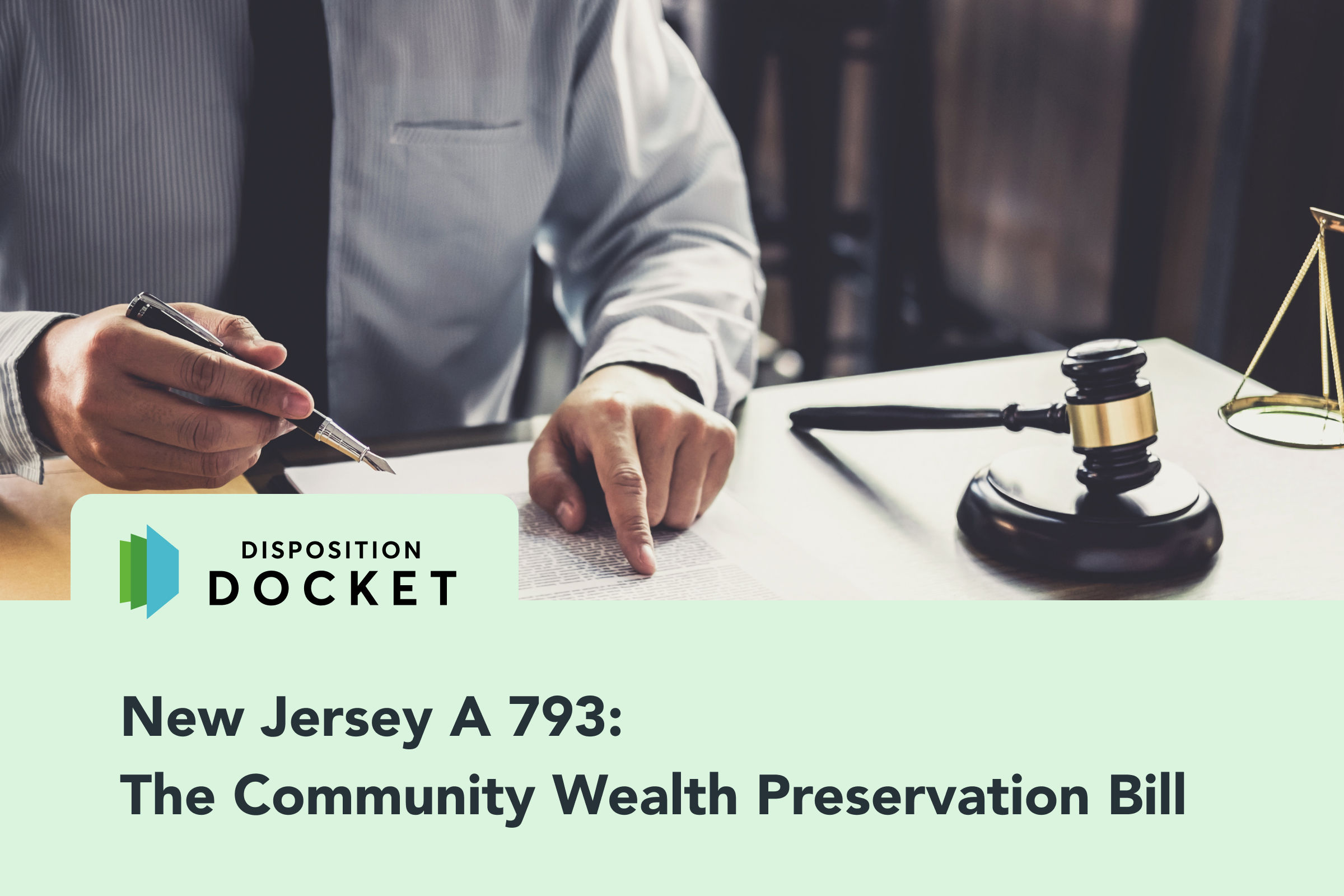
Welcome to the inaugural issue of Disposition Docket, our quarterly enewsletter that monitors and reports on legislation that could impact distressed disposition. As our industry continues to evolve, it’s more critical than ever to stay current on legislative action with information and commentary you can trust.
Assembly Bill 793 (Community Wealth Preservation Bill) creates additional avenues for debtors, family members of the debtor, nonprofits, and prospective owner occupants to purchase a property at sheriff’s foreclosure sales in New Jersey. The bill provides for: (i) the ability to obtain financing to buy at foreclosure sale; (ii) decreased initial deposit requirement to participate at a foreclosure sale for certain qualified bidders; and (iii) a right of first and second refusal to existing homeowners/next of kin and non-profits to purchase the property. As a result of language in the bill, homeowners/next of kin have an avenue to purchase properties back at 50% of the Total Debt regardless if the auction sale could produce a higher price.
Potential Issues:
Properties can be repurchased by homeowners/next of kin for 50% of total debt. The proposed bill states that a property may not be sold for less than 50% of the sum of the outstanding mortgage, including interest, fees, or other costs accumulated from the beginning of the foreclosure sale (“Total Debt”). The bill further states that such minimum sale price, defined as the “upset price,” can be no higher than 50% of the Total Debt. Therefore, the opening bid at sale must be set at 50% of the Total Debt since the property cannot be sold for less than 50% and the upset price cannot be greater than that amount. The bill further states that the homeowner or their next of kin may purchase the property at the opening bid amount, which is forced set at 50% of the Total Debt. As a result, homeowners/next of kin have an avenue to purchase properties back at 50% of the Total Debt regardless if the auction sale could produce a higher price. Consider the below scenario:
- The distressed property has a total debt of $200,000.
- At the auction, the minimum sale price is 50% of Total Debt or $100,000.
- The lender can set the upset price no higher than 50% of the total debt or $100,000
- The opening bid at auction is set at $100,000.
- Because the homeowner, homeowner’s next of kin, and non-profits have a right to purchase the property at opening bid, the property can be purchased for $100,000 regardless of demand.
The bill also states that it applies to REO sales, although the provisions are exclusively tailored to a foreclosure sale. The vast majority of the bill relates to practices only found in foreclosure sales. The bill, however, includes a singular sentence stating that the provisions of the bill will apply to REO sales. It is unclear how this will be applied to REO sales and the impact it can have on REO sales.
The program opens the door to collusion and fraud. To implement the provisions of this bill successfully, constant monitoring of owner occupancy and post-purchase sales would have to be monitored. For example, the opportunity afforded to debtors and next of kin of the right to purchase at the opening bid without an occupancy requirement invites opportunities for fraud and bad actors to take advantage of the process.
This bill has passed both chambers of the New Jersey state government. It is currently awaiting a decision from the Governor.
If you have any questions about the information provided in this quarter’s Disposition Docket, please contact your Auction.com Business Development Partner.
The information provided herein does not, and is not intended to, constitute legal advice; instead, all information, content, and materials available on this communication are for general informational purposes only.
